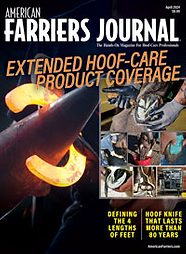The Trump administration reportedly is finalizing plans for stiff tariffs on steel and aluminum imports that could come as soon as Thursday. While United States lawmakers and trade partners are bracing for the fallout, farrier industry retailers and manufacturers say they aren’t as concerned.
Making good on a campaign promise, President Donald Trump says he will sign measures that will impose tariffs of 25% on steel and 10% on aluminum for every foreign shipment into the U.S. Although prices will increase, there’s no reason to expect an “enormous” hike, writes Neil Irwin, senior economic correspondent for The New York Times, noting that the U.S. only imports about one-third of its steel. John Harshbarger of Amarillo, Texas-based Well-Shod believes that will hold true in the farrier industry, as well.
“I don’t think it will be as big of an impact,” he told American Farriers Journal. “Most farrier products are already manufactured. You’ll probably see a small price increase in products, but you’ll see that in most anything that contains steel or aluminum.”
Farrier tool manufacturers that use American-made steel, such as Drummond, Wis.-based Bloom Forge don’t expect to see any ripple effects.
“We’re using very expensive material anyway,” explains Roy Bloom, a member of the International Horseshoeing Hall Of Fame. “We’re dealing with tool steel — S7 and H13 — not structural steel. Those are considered super hard. In order to get price breaks on those, you have to order in big quantities. I’m pretty certain that most of those are not made anywhere but here. Maybe it won’t affect tool makers at all.”
The potential tariffs come nearly 2 months after the U.S. Department of Commerce reported that imported metal is degrading the American industrial base and as a result threatens national security.
“People have no idea how badly our country has been treated by other countries,” Trump says. “They’ve destroyed the steel industry. They’ve destroyed the aluminum industry, and other industries, frankly. … We’re bringing it all back.”
The move would stem the flood of cheap metals into the U.S., particularly from China, the Trump administration says. However, China is 11th in steel imports to the U.S. with less than 2% of the volume in 2017, according to the International Trade Administration. The top 10 sources of U.S. steel imports are: Canada (16%), Brazil (13%), South Korea (10%), Mexico (9%), Russia (9%), Turkey (7%), Japan (5%), Taiwan (4%), Germany (3%) and India (2%).
“When a country (USA) is losing many billions of dollars on trade with virtually every country it does business with, trade wars are good, and easy to win,” according to a tweet by Trump. “Example, when we are down $100 billion with a certain country and they get cute, don’t trade anymore — we win big. It’s easy!”
The move was criticized by Republican lawmakers, including Sen. Ben Sasse of Nebraska, who called it a “massive tax increase on American families.
“Trade wars are never won,” according to a statement from Sasse. “Trade wars are lost by both sides. Kooky 18th-century protectionism will jack up prices on American families — and will prompt retaliation from other countries. Make no mistake: If the president goes through with this, it will kill American jobs — that’s what every trade war ultimately does. So much losing.”
Ohio Democrat Sherrod Brown supports Trump’s plans.
“This welcome action is long overdue for shuttered steel plants across Ohio and steelworkers who live in fear that their jobs will be the next victims of Chinese cheating,” according to a statement from the senator. “President Trump must follow through on his commitment today to save American steel jobs and stop Chinese steel overcapacity from continuing to infect global markets. If we fail to stand up for steel jobs today, China will come after other jobs up and down the supply chain tomorrow.”
Some retailers and manufacturers such as Steve Hoselton of Lexington, Ill.-based Anvil Brand Shoe Co. believe that Trump is trying to put the United States in a better negotiating position with its trade partners.
“Trump puts rhetoric out there to bargain from a position of strength,” says Hoselton, who’s also an attorney. “The U.S. doesn’t have that position unless he threatens a tariff.”
Trump long has made a priority of renegotiating the North American Free Trade Agreement (NAFTA) between Canada and Mexico. The president opened the door for exemptions from the proposed tariffs for those two countries should they agree to a new deal.
“We have large trade deficits with Mexico and Canada,” Trump tweeted. “NAFTA, which is under renegotiation right now, has been a bad deal for U.S.A. Massive relocation of companies & jobs. Tariffs on Steel and Aluminum will only come off if new & fair NAFTA agreement is signed.”
It’s a tactic that Harshbarger can envision Trump employing not just with Canada and Mexico but with other trade partners, as well.
“Trump can stir them up,” he says. “Unlike typical politicians, when he says things, they get pushed on through. If a tariff is imposed, I don’t know that it will be 25%. It could be negotiated to a lower percentage.”








Post a comment
Report Abusive Comment